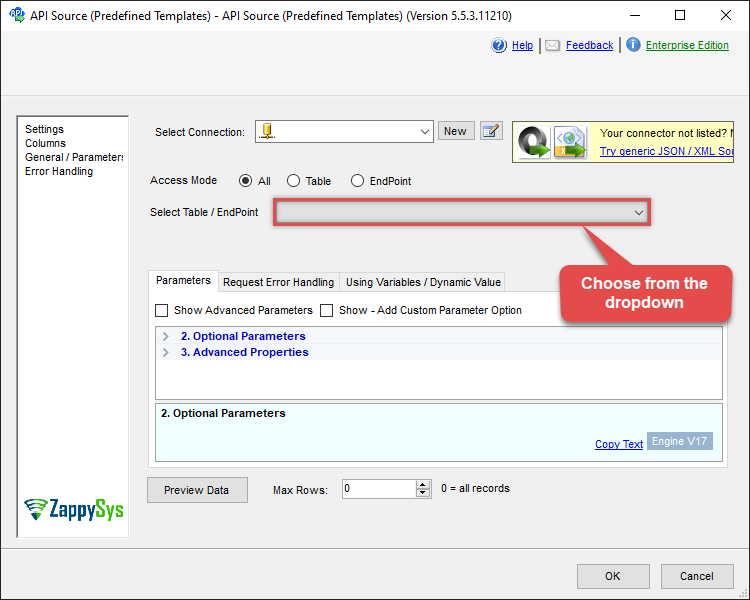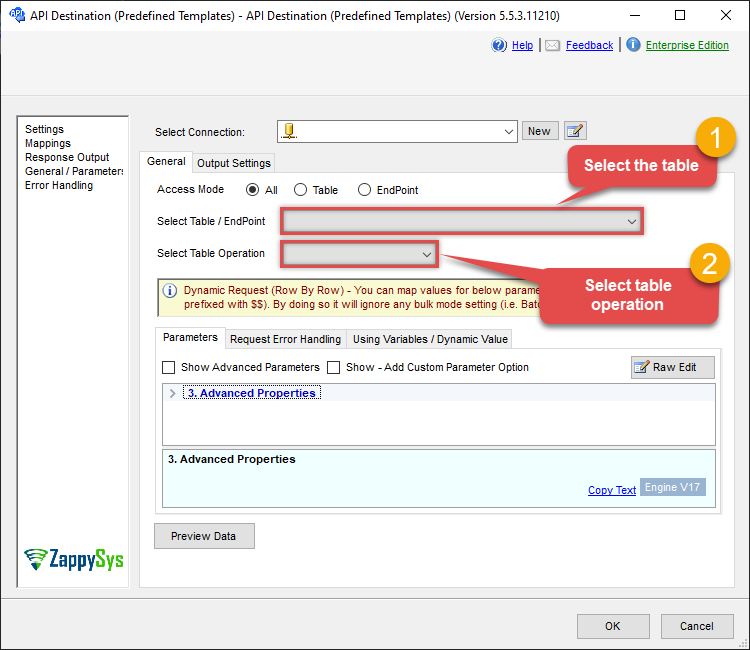Endpoint List Meetings
Name
list_meetings
Description
Get the list of scheduled meetings. For current user (me) or specified user Id. To get more details about a meeting you can call get_meeting EndPoint. [API reference]
Related Tables
Parameters
| Parameter | Required | Options | ||||||||||||
|---|---|---|---|---|---|---|---|---|---|---|---|---|---|---|
|
Name:
Label: UserId The user ID or email address of the user. For user-level apps, pass the me value. |
YES | |||||||||||||
|
Name:
Label: Meeting Type |
|
|||||||||||||
|
Name:
Label: PageSize |
Output Columns
| Label | Data Type (SSIS) | Data Type (SQL) | Length | Description |
|---|---|---|---|---|
| id |
DT_I8
|
bigint
|
||
| topic |
DT_WSTR
|
nvarchar(500)
|
500 | |
| type |
DT_I8
|
bigint
|
||
| start_time |
DT_DBTIMESTAMP
|
datetime
|
||
| duration |
DT_I8
|
bigint
|
||
| timezone |
DT_WSTR
|
nvarchar(100)
|
100 | |
| agenda |
DT_WSTR
|
nvarchar(4000)
|
4000 | |
| created_at |
DT_DBTIMESTAMP
|
datetime
|
||
| join_url |
DT_WSTR
|
nvarchar(1000)
|
1000 | |
| pmi |
DT_WSTR
|
nvarchar(100)
|
100 | |
| uuid |
DT_WSTR
|
nvarchar(100)
|
100 |
Input Columns
| Label | Data Type (SSIS) | Data Type (SQL) | Length | Description | |||||||||||||||||||||||||||||||||||||||||||||||||||||||||||||||||||||||||||||||||||||||||||||||
|---|---|---|---|---|---|---|---|---|---|---|---|---|---|---|---|---|---|---|---|---|---|---|---|---|---|---|---|---|---|---|---|---|---|---|---|---|---|---|---|---|---|---|---|---|---|---|---|---|---|---|---|---|---|---|---|---|---|---|---|---|---|---|---|---|---|---|---|---|---|---|---|---|---|---|---|---|---|---|---|---|---|---|---|---|---|---|---|---|---|---|---|---|---|---|---|---|---|---|---|
| There are no Static columns defined for this endpoint. This endpoint detects columns dynamically at runtime. | |||||||||||||||||||||||||||||||||||||||||||||||||||||||||||||||||||||||||||||||||||||||||||||||||||
Examples
SSIS
Use Zoom Connector in API Source or in API Destination SSIS Data Flow components to read or write data.
API Source
This Endpoint belongs to the Meetings table, therefore it is better to use it, instead of accessing the endpoint directly:
| Required Parameters | |
|---|---|
| UserId | Fill-in the parameter... |
| Optional Parameters | |
| Meeting Type | scheduled |

API Destination
This Endpoint belongs to the Meetings table, therefore it is better to use it, instead of accessing the endpoint directly. Use this table and table-operation pair to list meetings:
| Required Parameters | |
|---|---|
| UserId | Fill-in the parameter... |
| Optional Parameters | |
| Meeting Type | scheduled |

ODBC application
Use these SQL queries in your ODBC application data source:
List Meetings
List all the meetings for a selected User
SELECT * FROM Meetings
WITH(
UserId ='me' -- enter user id or email
)
--You can get UserId by selecting from 'list_users' endpoint and also this value available as dropdown value for UserId parameter.
list_meetings endpoint belongs to
Meetings
table(s), and can therefore be used via those table(s).
SQL Server
Use these SQL queries in SQL Server after you create a data source in Data Gateway:
List Meetings
List all the meetings for a selected User
DECLARE @MyQuery NVARCHAR(MAX) = 'SELECT * FROM Meetings
WITH(
UserId =''me'' -- enter user id or email
)
--You can get UserId by selecting from ''list_users'' endpoint and also this value available as dropdown value for UserId parameter.';
EXEC (@MyQuery) AT [LS_TO_ZOOM_IN_GATEWAY];
list_meetings endpoint belongs to
Meetings
table(s), and can therefore be used via those table(s).
